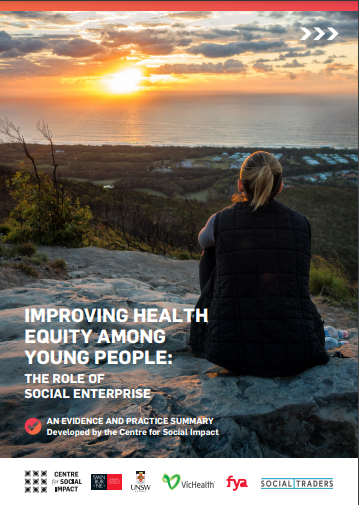The Centre for Social Impact has launched a guide to provide practical, evidence-based guidance about the role of social enterprises in addressing health inequities among young people (15-24) experiencing disadvantage and their communities.
The Improving health equity among young people: The role of social enterprise guide was generated through a joint partnership between CSI, VicHealth, Social Traders and the Foundation for Young Australians, with funding support from the Australian Research Council Linkage program. It provides a much-needed evidence base on how social enterprises can redress social determinants of health inequities among young Australians.
The guide found that effective social enterprises increase young people’s access to employment and/or their employability, improve young people’s self-reported mental health and wellbeing, positively influence healthier behaviours, including healthy eating, reduced smoking, and drug us, significantly improve young people’s confidence and social skills in professional and personal contexts and foster positive new relationships and connections.
The research also finds that the industries in which social enterprises operate can affect health equity among young people and that social enterprises are not well-recognised in Australia’s employment services system.
Chief researcher and Director of the Centre for Social Impact Swinburne, Distinguished Professor Jo Barraket, says that during the transition to adulthood, health inequities may become entrenched, and young people in disadvantaged areas experience relatively poorer health conditions than the wider population – which is why it’s important for all sectors and levels to address the health inequities experienced by young people.
“For young people who experience disadvantage, health inequities are made worse by multiple, and often complex, barriers to economic participation. With the economic contraction from COVID-19 – which raised youth unemployment from 11.5% to 16.1% in May 2020 – disadvantaged young people are less likely to enjoy the benefits to wellbeing that education and economic participation bring,” Professor Barraket said.
“We need to recognise both the systemic challenges and the personal challenges for young people transitioning into employment if we are to create equity and effective spaces to learn and build relationships. This report sets out to document how social enterprises do this, acting as a guide for policy makers, social enterprises and their stakeholders.”
Although the focus of this guide is on social enterprises, Barraket said many of these features are broadly relevant to public health planning, and policy and practice related to designing effective social services and inclusive businesses.
The guide identifies four overlapping features of work integration social enterprises that support health equity outcomes for young people. These are:
- Diverse work settings and spaces for learning – catering to diverse learning styles, such as hands-on forms of learning and fostering opportunities to develop new relationships and work with a variety of people within and outside the social enterprise, including different management styles and personalities.
- Flexible and responsive wraparound support – supporting people where they are at, creating an understanding and empathetic environment in which barriers to learning can be addressed; one which reduces stigma around literacy, numeracy or physical and mental health differences.
- Blended culture of education and work – creating spaces of belonging and safety while balancing real world expectations for work, links learning to employment, empowers young people to imagine themselves in the industry or social enterprise as ‘emerging staff members’ and increases confidence of young people by building their relationships within the social enterprise and with industry partners.
- Respectful and inclusive workplace – recognising young people’s assets and personal challenges that they are going through, creating safe spaces to learn, collaborate and minimise any risks with transitioning into employment and including young people as active contributors in the workplace.
The findings were generated over three years from case studies at four employment-focused social enterprises located in New South Wales and Victoria, focusing on how social enterprises can be designed and operated to address health inequities among young people who experience disadvantage.

Download Improving health equity among young people: The role of social enterprise eBook by filling out the form below.












